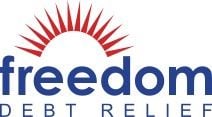Freedom Debt Relief for Debt Settlement: 2025 Review
Freedom Debt Relief offers debt settlement plans that can help you get out of debt, but it’s risky. Compare debt settlement with other debt payoff alternatives.
Many, or all, of the products featured on this page are from our advertising partners who compensate us when you take certain actions on our website or click to take an action on their website. However, this does not influence our evaluations. Our opinions are our own. Here is a list of our partners and here's how we make money.
Freedom Debt Relief is a debt settlement company that negotiates on behalf of consumers to lower how much debt they owe to their creditors.
Consumers who complete Freedom Debt Relief’s debt settlement program reduce their enrolled debt by an average of 20% to 25% after fees, according to the company.
AD
Debt settlement is risky. There’s no guarantee of success, and it can seriously damage your credit. Before opting into debt settlement, NerdWallet recommends first exploring other ways to get out of debt, like enrolling in a debt management plan or applying for a debt consolidation loan.
» MORE: What is debt settlement?
Freedom Debt Relief at a glance
Minimum debt required to enroll: | $7,500. |
Types of debt eligible for enrollment: | Unsecured debt, including credit cards, medical debt, personal loans, private student loans, collections, lines of credit, repossessions and payday loans. |
Settlement fee: | Up to 25% of the total debt enrolled. |
Account fees: | $9.95 setup fee. $9.95 monthly maintenance fee. |
How long it may take: | Two to four years. |
How much you may save: | 20% to 25% of enrolled debt after fees. |
Availability: | Freedom is available in AL, AK, AR, AZ, CA, DE, FL, IA, ID, IN, KY, LA, MA, MD, MI, MN, MO, MS, MT, NC, NE, NM, NV, NY, OK, PA, SD, TN, TX, UT, WI. Freedom works with legal partners to provide debt settlement services in: CT, GA, NH, NJ, IL, KS, ME, OH, SC, VA. |
How does Freedom Debt Relief work?
Freedom Debt Relief works by negotiating with your creditors to settle your debts for less than you owe.
Once you enroll in Freedom’s debt relief program, you’ll be instructed to stop making payments on your debts and open an FDIC-insured escrow account, which you’ll pay into instead. Freedom works with you to determine the amount to be deposited each month — you may be given a few options — and you own and control the account.
As money accrues in the escrow account, Freedom begins negotiating with creditors on your behalf in an effort to get them to accept less than the amount you owe. The idea is that after months of nonpayment, the creditor will be motivated to take the lower sum rather than risk getting nothing at all. Freedom uses an algorithm that looks at each client's set of creditors and optimizes the negotiation order to try to maximize success, according to the company.
If a creditor accepts the lower payoff amount, you pay the creditor from your dedicated account, and the debt is then considered settled.
Freedom says most customers receive their first settlement within three months, but it can take longer depending on how much you save each month, the number of accounts enrolled in the program and the amount owed on each account.
How much does Freedom Debt Relief cost?
The biggest cost of debt settlement is the settlement fee. Freedom Debt Relief’s settlement fee is 25% of the total enrolled debt, though it may be as low as 15%, depending on your state of residence and the amount of debt you enroll in the program.
Here’s how the settlement fee works. If you enroll in debt settlement with $15,000 in credit card debt, and you’re able to settle for $8,000, you’ll pay a settlement fee of $3,750 (25% of $15,000). This is in addition to the $8,000 you pay to your creditors. Altogether you’ll pay $11,750.
A debt settlement company cannot collect a debt settlement fee until it successfully settles a debt.
Other costs to using Freedom Debt Relief include a one-time $9.95 setup fee and a monthly fee of $9.95 for maintaining the escrow account.
Is Freedom Debt Relief legit?
Freedom Debt Relief is a legitimate debt settlement company founded in 2002. It’s accredited by the Better Business Bureau (BBB) with an A+ rating and holds an accreditation from the American Association for Debt Resolution (AADR).
It’s important to carefully weigh the pros and cons before deciding whether to work with Freedom Debt Relief.
Free debt evaluation.
24/7 online dashboard.
May refund some fees.
Risky way to get out of debt.
No guarantee of success.
Pros of Freedom Debt Relief
Free debt evaluation: Freedom Debt Relief provides a no-obligation debt evaluation to all prospective customers at no additional cost. As part of the evaluation, Freedom will look at the debts you want settled, as well as your income and expenses, then review your options. Freedom may recommend other services beside debt settlement, such as a debt consolidation loan.
24/7 online dashboard: Freedom customers have 24/7 access to an online dashboard, where they can monitor their progress in the program, view escrow payments and accept settlement offers. They also have access to free educational resources, the company says.
Fees may be refunded: As part of the company’s program guarantee, if the total settlement cost is more than the total amount of debt you enrolled in the program, Freedom will refund the difference, up to 100% of collected fees. This ensures you don’t end up in a worse position than you started if, for example, you aren’t able to settle your debts for much less than you owe, and the settlement fee ends up wiping out any potential savings.
Cons of Freedom Debt Relief
A risky way to get out of debt: There are risks in working with Freedom Debt Relief, including a major hit to your credit, falling deeper into debt as you await a successful settlement negotiation and even the possibility of being sued by a creditor. Learn more about debt settlement risks lower down.
No guarantee of success: Like all debt settlement companies, Freedom Debt Relief may not be able to settle all your debts even if you follow the program perfectly. This is because not all creditors accept settlement offers.
How to qualify for Freedom Debt Relief
Freedom Debt Relief works with consumers who have at least $7,500 in unsecured debt from credit cards (including department store credit cards), medical bills, personal loans, private student loans, collection accounts, repossessions, lines of credit and payday loans.
Freedom Debt Relief doesn’t settle secured debts, meaning any debt tied to collateral, like an auto loan or mortgage. It also doesn’t settle debt from taxes, utility bills, lawsuits and federal student loans.
According to Freedom, new clients typically enroll with an average of $25,000 in unsecured debt across seven to nine credit accounts.
Freedom Debt Relief does a soft credit pull during the application process. A soft credit pull won’t affect your credit score.
Know the risks of debt settlement
It’s important to understand the overall risks of debt settlement before deciding whether to work with Freedom Debt Relief.
Organizations like the Consumer Financial Protection Bureau and the Federal Trade Commission urge consumers interested in debt settlement to consider these risks:
It will hurt your credit: Because you’re required to stop making payments on enrolled debts, those accounts will be marked delinquent on your credit reports. Your credit score will take a significant hit, especially if you weren’t already delinquent on those accounts. Delinquencies and settled accounts stay on your credit reports for seven years.
Interest and fees continue to accrue: Until you enter a settlement agreement, you’ll accrue additional interest and late fees on your debt. If you don't stick with the program to completion, or if the debt settlement company can't negotiate a settlement, you may end up with an overall higher balance.
You may still hear from creditors or debt collectors: There’s no guarantee your creditors will want to work with a debt settlement company, and you may be contacted by debt collectors or sued by creditors during the process.
Forgiven debt may be considered taxable income: Forgiven debts over $600 may be counted as income on your taxes. Creditors may send a 1099-C form to you in the mail and to the IRS. One exception is if you are insolvent (your liabilities exceed your total assets) at the time the company settles with your creditors.
Freedom Debt Relief vs. National Debt Relief
Freedom Debt Relief and National Debt Relief are two large debt relief companies that offer similar debt settlement programs. Both settle unsecured debts with a minimum requirement of $7,500, and they charge the same settlement fee (up to 25% of enrolled debt) for their services. Both project the same average savings after fees and the same average time frame.
Freedom Debt Relief has been around slightly longer than National Debt Relief, but it’s not available in as many states. However, Freedom offers consumer-friendly features like a 24/7 online dashboard where customers can monitor their progress and a program guarantee that includes refunded fees for customers who don’t save on their settled debts.
Alternatives to hiring a debt settlement company
Do-it-yourself debt settlement
Though it may seem easier to have a third party, like a debt settlement company, intervene on your behalf, you could have just as much success calling your creditors and negotiating with them yourself — and you can save thousands by not having to pay a settlement fee. Same as with using a debt settlement company, success isn't guaranteed, but if you owe only a few creditors, it’s worth a try.
Debt management plan
With a debt management plan, you’ll work with a nonprofit credit counseling agency to consolidate your debts into one monthly payment, while also reducing the interest rate. This is a good option for consumers with credit card debt who have a steady income to repay the debt within three to five years. Unlike debt settlement, a debt management plan should help build your credit score.
» MORE: What is a debt management plan?
Debt consolidation loan
By taking out a debt consolidation loan, you can pay off multiple debts at once, so you’re left with only one payment on your new loan. These loans are available to borrowers across the credit spectrum, and you can often pre-qualify with lenders to see your rates with a soft credit check. A debt consolidation loan should have a lower interest rate than your current debts, which saves money and helps you get out of debt faster.
Bankruptcy
Bankruptcy lets you resolve your debt under protection from a federal court. Chapter 7 bankruptcy, the most common form, erases most unsecured debts in four to six months. It’ll also stop calls from collectors and prevent lawsuits against you. Like with debt settlement, your credit will suffer, so consult a bankruptcy attorney first.
» MORE:The six types of bankruptcy



